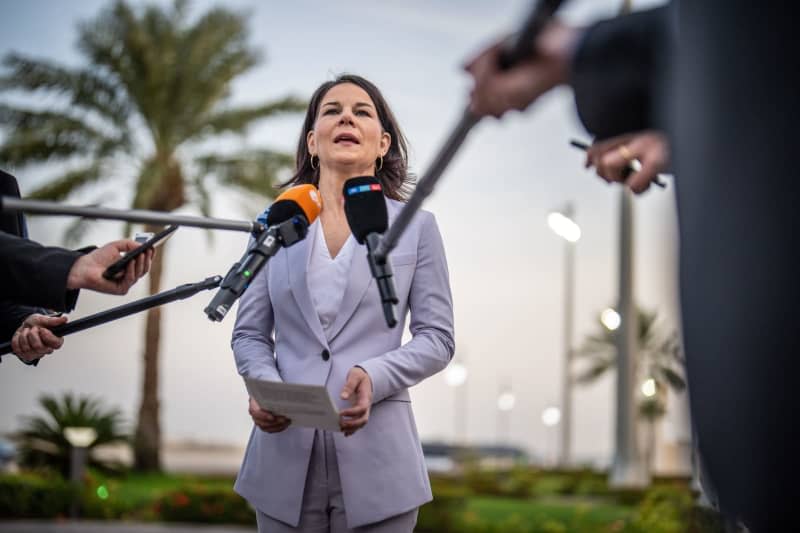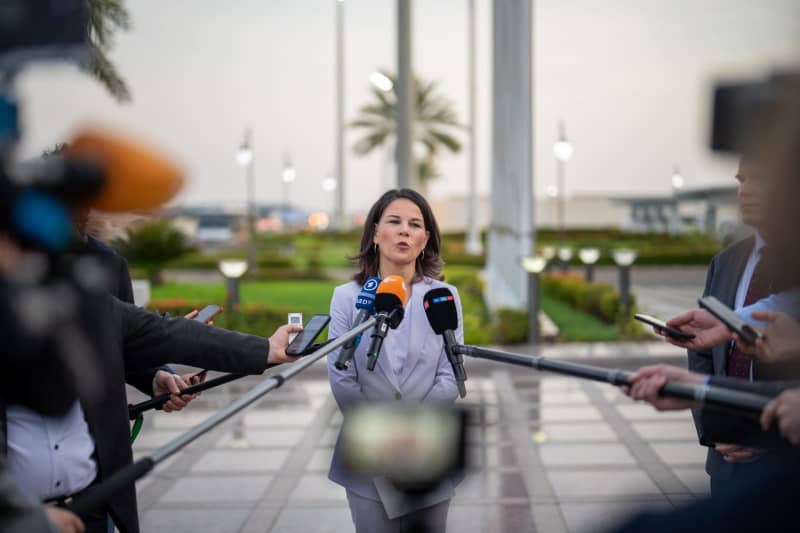German foreign minister's Djibouti trip diverted over lacking permit

- Oops!Something went wrong.Please try again later.
German Foreign Minister Annalena Baerbock has taken a stop in Djibouti in East Africa off her travel itinerary after her government jet failed to receive permission to fly over Eritrea.
Baerbock's plane was instead diverted to Jeddah in western Saudi Arabia, where the delegation will spend the night.
The delegation had hoped to continue the trip to Djibouti on Thursday but ultimately cancelled the Djibouti leg of the tour, delegation sources told dpa.
"The trip will continue tomorrow with the Kenya part of the programme," the sources said.
Baerbock's Airbus A321LR aircraft landed in the Saudi port city at 2:15 pm (1315 GMT) after previously circling over the Red Sea for more than an hour.
"When things happen that are not actually planned, you have to be flexible," the minister said pragmatically after landing. In a crisis region, not everything can run "as it would in normal, peaceful times," said Baerbock.
Plans were adjusted accordingly. Baerbock had originally wanted to hold talks in Djibouti, Kenya and South Sudan by Friday.
With this trip, she wanted to make it clear to the many neighbouring countries that Berlin is "not only concerned, but [was] not forgetting the people there, especially with regard to the war in Sudan," she stressed.
"[It is important to realize] that a stopover in a place that is not planned is really the least of our problems in these geopolitically challenging and dramatic times," Baerbock said.
"Despite all our efforts, we unfortunately did not receive our overflight clearance to Eritrea," said the flight captain. We therefore had to "bite the bullet" and divert to Jeddah.
According to the delegation, it was also difficult to obtain the overflight authorization because there had been a power failure in the Eritrean Foreign Ministry. There were also no alternative options for another flight route.
It is not unusual for overflight authorizations to be granted during the course of a flight, but the German Foreign Office had only been informed in the morning shortly before departure that no such authorization had been granted for the originally scheduled aircraft. It had been decided to rely on the fact that the relevant authorization would be granted during the flight.
In view of attacks launched on ships in the Red Sea by the Iranian-backed Houthi militants in Yemen, it was also not possible to fly around Eritrea at short notice, according to the delegation.
Baerbock was originally scheduled to meet Djibouti's foreign minister, Mahamoud Ali Youssouf, on Wednesday afternoon.
It was important to her to travel to Djibouti, Baerbock said about her actual destination - "with a view of this strait of only 27 kilometres between Djibouti and Yemen, from where the Houthis launch their attacks."
In doing so, she wanted to make it clear that Germany, as Europeans, takes "responsibility for freedom of navigation, for the safety of the Red Sea."
The situation in the Red Sea was causing massive instability for world trade and for the region, she said.
Baerbock described the military mission planned by the EU to protect civilian shipping in the Red Sea as an important contribution to the stability of the entire region.
"It is important for me to emphasize that it is a protection mission for the ships on the ground, in other words a defensive mission," the Green politician said in Jeddah.
The Europeans' mission would "if it is decided to go ahead, not result in any attacks on Yemen." However, the right to individual and collective self-defence would apply, she added.
Baerbock left Germany with plans to visit Djibouti, Kenya and South Sudan over the coming days for crisis diplomacy talks focused on the bloody power struggle being waged between rival factions in Sudan.
Baerbock's foreign travel has been plagued with technical issues in recent months.
Her departure for the three-day trip was complicated by engine trouble with the planned government aircraft, leading Baerbock to depart Germany on a troop transport aircraft instead.
In August, Baerbock had to cancel a long-planned trip to Australia, New Zealand and Fiji after technical problems on her older government aircraft forced her to land in Abu Dhabi.
The two long-haul Airbus A340 aircraft belonging to Germany's air force have since been taken out of service.



